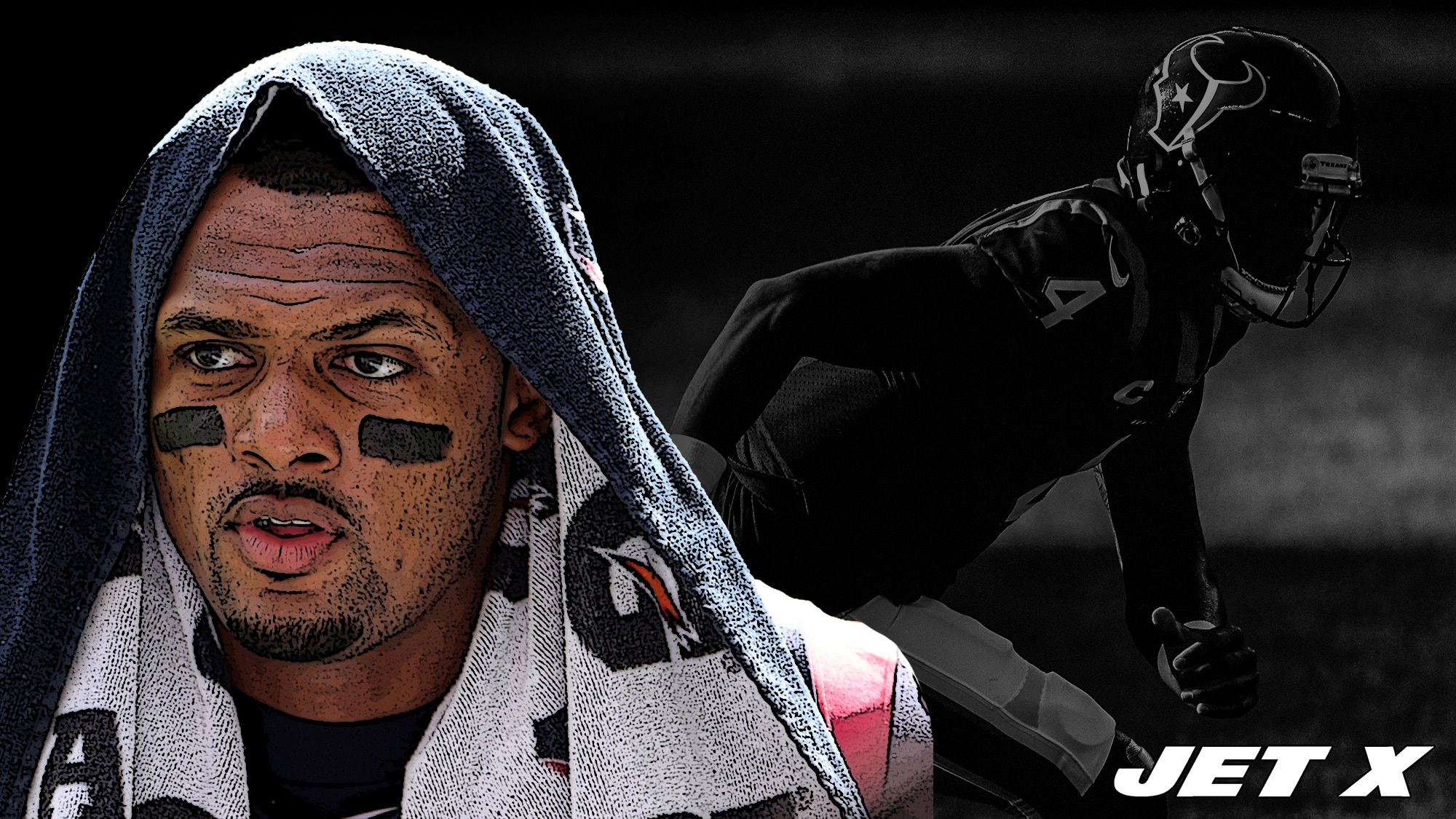Exploring what it would cost Joe Douglas and the New York Jets to acquire disgruntled Houston Texans quarterback Deshaun Watson.
Imagine it, feel it and totally soak in the visions that have Deshaun Watson running on to the MetLife Stadium field in early September 2021—with a capacity crowd to boot, because what’s a dream without going all the way?
“Rudy, Rudy, Rudy … ” Sorry, I slipped away for a moment there. Anyway, this particular Mr. Watson needs no Sherlock. He’s a true Batman that can lead a team to the promised land, so long as that team isn’t the Houston Texans.
ESPN’s Adam Schefter dropped yet another Watson bomb Sunday afternoon. According to certain sources, it’s believed Watson will never play another game for the Texans. Sprinkle in his previous desire that the Texans interview now-New York Jets head coach Robert Saleh, a “like to unlike” action on a pro-Watson to the Jets tweet, and suddenly, Watson to the Jets has everybody in a frenzied state.
The fit is obvious. New York needs a stud quarterback and it has plenty of ammunition to pull off a deal. It’s led the quarterback-starved fanbase to climb aboard the idea that Joe Douglas must do everything and anything in his power to acquire the three-time Pro Bowler.
I’m not on that train.
Acquiring Watson is certainly a worthwhile move, but everything in life has a price. Everything has a general value. The key is exploiting that value, and knowing Douglas’s work as an NFL front-office individual, value will be the name of this game.
What would it take to acquire the Clemson product?
It starts at two first-rounders
Any potential Watson deal starts at two first-rounders. It doesn’t end there—not even close.
There are few historical examples to pull from. Perhaps the closest thing is when the Denver Broncos traded Jay Cutler to the Chicago Bears in 2009. Chicago sent two first-rounders and a third-round selection, along with quarterback Kyle Orton, for Cutler and a fifth-rounder.
At that stage, Cutler, an 11th overall pick (Watson was a 12th overall pick), made one Pro Bowl in three seasons. He threw for 4,526 yards and 25 touchdowns to 18 interceptions in 2008—his last season in Denver. Cutler didn’t nearly have the same resume as Watson, the three-time Pro Bowler, does now, and he fetched two firsts and change.
The package will most likely start at two first-rounders. Realistically, it’ll take at least three.
Potential package
Jets acquire:
- Deshaun Watson, QB
Texans acquire:
- 2021 Round 1, No. 2 (NYJ)
- 2021 Round 1, No. 23 (SEA)
- 2022 Round 1 (SEA)
- Sam Darnold, QB
These three picks might not get it done, but when considering the value of the No. 2 overall pick, it should. Top 10 picks (especially top five) hold incredible value when compared to first-rounders after No. 10.

In Jimmy Johnson’s draft pick value chart, the No. 2 selection is worth a cool 2,600 points. The No. 1 pick is worth 3,000. The No. 11 pick, held by the New York Giants, is worth just 1,250. The No. 23 pick brings just 760 points to the table.
What No. 2 does in this equation is massive. But it also makes the Miami Dolphins, who hold the No. 3 pick (originally the Texans’, quite ironically), incredible threats to land Watson. Houston can solve its newly-created quarterback problem with the No. 2 overall pick or give Sam Darnold a ride.
If the Jets are forced to give up a fourth pick, it could look something like this:
Jets acquire:
- Deshaun Watson, QB
- 2022 Round 4 (HOU)
Texans acquire:
- 2021 Round 1, No. 2 (NYJ)
- 2021 Round 1, No. 23 (SEA)
- 2022 Round 1 (SEA)
- 2022 Round 2
- Sam Darnold, QB
I’d be hesitant to give up that fourth pick without getting one in return. There are massive holes on the roster and Watson’s hefty salary would limit Douglas’s ability to fill those holes moving forward. It shouldn’t be viewed as a dealbreaker, but I think three first-rounders and Darnold (with the No. 2 pick involved) is plenty of ammunition.
Watson’s no-trade clause looms large
Anybody old enough to remember the Jamal Adams trade knows Douglas’s love of value. The man learned from one of the best, Ozzie Newsome, which means he lives and breathes value.
Douglas knows NFL team-building always comes down to the NFL draft. Any potential trade of free-agent signings needs to be viewed as the cherry on top of an already-built infrastructure. Watson is a little different, considering his ability and the position he plays. Nonetheless, assets are required to rebuild this roster.
Watson’s no-trade clause could serve as a Jets bonus only if the Texans stud quarterback has his eye on the Jets and nobody else. That’s the key.
If he’s willing to be shipped to multiple spots, the no-trade isn’t as impactful. If he takes a hard stance on playing for Saleh and the Jets, Douglas can bide his time and wait this thing out until Houston has no choice but to relent.
Final thoughts
I’m on the “trade for Watson” train, but I’ve lept from the “do whatever it takes” to land the man train that will not stop anytime soon. Such a mindset is what gets NFL organizations into trouble when going about business. It always comes down to value, and that’s especially the case for the better general managers in the league.
How Watson impacts the Jets’ immediate future is another topic that’ll certainly need to be discussed. It’ll drastically shorten the window and overall flexibility Douglas would have when plugging holes. Not operating under the ease of the rookie quarterback window—courtesy of the rookie wage scale—is a discussion worth having.
If the New York Jets want Deshaun Watson, it’ll likely cost them three first-round picks and then some.


